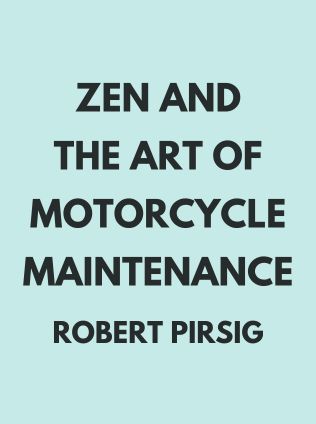
Zen and the Art of Motorcycle Maintenance
An Inquiry Into Values (Phaedrus, #1)
By Robert Pirsig
Published 04/1974
About the Author
Robert M. Pirsig, a figure as enigmatic as the ideas he explored, was born on September 6, 1928, in Minneapolis, Minnesota. Pirsig's life journey was as meandering and profound as the narrative he crafted in his magnum opus, Zen and the Art of Motorcycle Maintenance. A child prodigy with an IQ of 170, Pirsig began his college education at the tender age of 15, studying biochemistry at the University of Minnesota. However, his path soon veered from the scientific to the philosophical, as he became increasingly disillusioned with the rigidity of scientific explanations and sought answers in the realm of metaphysics.
Pirsig's early life was marked by a search for meaning that led him through various disciplines, from journalism to rhetoric, and even to Eastern philosophy during a sojourn in India. This intellectual restlessness culminated in a mental breakdown, after which Pirsig underwent electroconvulsive therapy. The experience fragmented his identity, splitting him into two personas: the "before" Pirsig, whom he named Phaedrus, and the "after" Pirsig, the narrator of his own story. It is this duality, this ongoing conversation between Phaedrus and Pirsig, that forms the crux of his seminal work.
Main Idea
Zen and the Art of Motorcycle Maintenance is more than just a travelogue or a philosophical treatise; it is a journey into the self, a meditation on what it means to live a life of quality. At its heart, the book explores the dichotomy between classical and romantic modes of understanding the world. Classical understanding is rooted in reason, order, and logic, while romantic understanding is driven by emotion, intuition, and the aesthetic experience. Pirsig's narrative, which oscillates between a cross-country motorcycle journey and philosophical musings, invites the reader to find a synthesis between these two approaches, to see the harmony that exists between the practical and the spiritual.
Through the metaphor of motorcycle maintenance, Pirsig illustrates the importance of caring for the world around us with attention and love. He argues that when we engage deeply with even the most mundane tasks—like fixing a motorcycle—we can experience a connection to a greater, ineffable quality. This quality, which Pirsig links to the Tao, is the source of all good things in life, from the joy of craftsmanship to the peace found in spiritual enlightenment.
Table of Contents
- The Motorcycle as Metaphor
- The Duality of Man: Phaedrus and the Narrator
- Classical vs. Romantic Understanding
- The Concept of Quality
- The Chautauquas: Philosophical Discourses
- Gumptionology: The Art of Engagement
- The Journey and the Destination
The Motorcycle as Metaphor
At the beginning of the journey, Pirsig introduces the motorcycle not just as a vehicle of transportation but as a powerful symbol of the interplay between man, machine, and mind. The motorcycle represents the complex relationship between technology and human experience. It is a machine that requires both classical knowledge—understanding the mechanics of how it works—and a romantic appreciation—an awareness of how it feels to ride, the freedom it provides, and the connection it fosters between rider and road.
"The motorcycle is primarily a mental phenomenon. People get obsessed with this or that technological wonder... and never really understand the totality of the machine they are dealing with." — Robert M. Pirsig
Through the motorcycle, Pirsig invites the reader to consider their own relationship with technology. Are we merely users of machines, or can we become partners with them, understanding their workings and maintaining them with care and precision? The act of motorcycle maintenance, in Pirsig's eyes, becomes a form of meditation, a way to engage with the world that is both thoughtful and deeply personal.
Sign up for FREE and get access to 1,400+ books summaries.
You May Also Like
The Subtle Art of Not Giving a F*ck
A Counterintuitive Approach to Living a Good Life
By Mark MansonRich Dad Poor Dad
What the Rich Teach Their Kids About Money - That the Poor and Middle Class Do Not!
By Robert T. KiyosakiHow To Win Friends and Influence People
The All-Time Classic Manual Of People Skills
By Dale Carnegie



















